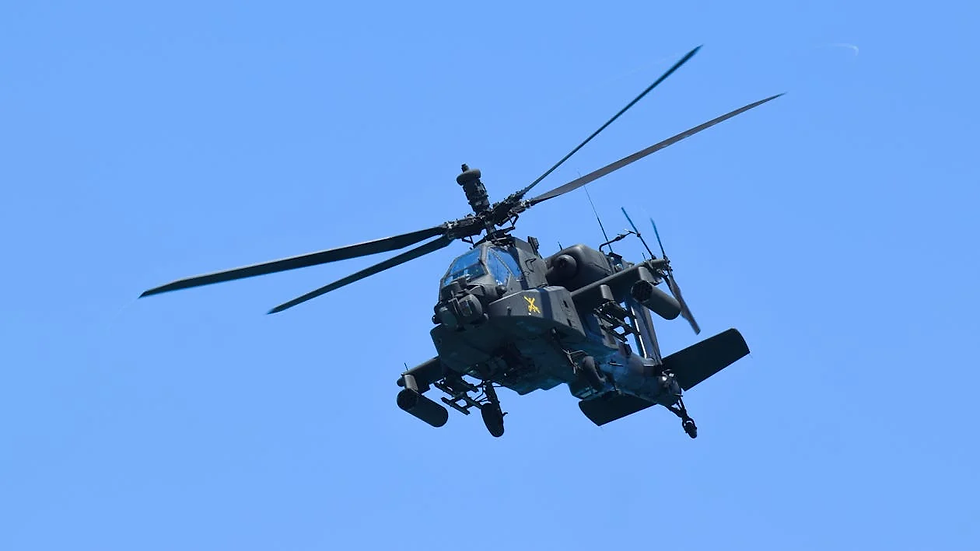President Biden Launches Airstrike Against Iran-Backed Militias
- Elsa Ruloff

- Mar 2, 2021
- 3 min read
Updated: Dec 23, 2024
A little over a month after the inauguration of President Biden, the administration has taken its first military steps against Iranian-backed militias in Syria. The air strike, launched “at President Biden’s direction”, killed at least 22 people along the border between Syria and Iraq according to the Syrian Observatory for Human Rights.
The Pentagon claims that the strike “sends an unambiguous message”. While it vows to protect American and Coalition personnel, it also promises that it has acted deliberately to de-escalate the situation in Eastern Syria and Iraq. Pentagon Press Secretary John Kirby maintains that the strike was not meant to raise tensions with Iran, but as a punishment directed towards the militias.

Hezbollah, an ally of the Syrian government, has denied any involvement in recent actions against the interests of the US. However, both militia groups in question, Kataib Hezbollah and Kata'ib Sayyid al-Shuhada, have been responsible for past attacks on US assets. Kataib Hezbollah has been recognized by the US as a terrorist group since 2009, and has been accused of being responsible for instability in Iraq. Syria’s foreign ministry says “It is a bad sign regarding the policies of the new US administration”, and that it “strongly condemns the cowardly American aggression”.
Several attacks targeted towards US assets have previously been claimed by smaller, abstruse groups. US Defence Secretary, Lloyd Austin affirms “We know what we hit,” and is “confident that that target was being used by the same Shia militants that conducted the strikes [on February 15th].” Several Western and Iraqi officials add that these smaller, lesser-known groups are fronts for established militias, which makes it possible for them to carry out attacks without accountability and repercussions.
The strike was carried out ten days after a rocket attack against US assets, which killed one American service member and wounded 5 others. Attacks were also carried out on bases in Baghdad, including the US embassy and other diplomatic establishments. “The messaging around this strike is probably more important than the strike itself," says Paul Adams of BBC News. The US has thanked the Iraqi government for its intelligence input; the Pentagon says that the strike was organized with “diplomatic measures”, and that coalition partners were consulted.
The strike, according to American officials, was relatively small - seven 500-pound bombs dropped on the unofficial border crossings used to smuggle across both weapons and fighters. President Biden allegedly opted for a less aggressive alternative, after the Pentagon proposed attacking a larger number of targets.
The strikes were carried out on the Syrian side of the Syrian/Iraqi, reportedly to avoid hostility from the Iraqi government, though the strikes took place just over 12 kilometers from the border. “The strikes hit lorries carrying munitions,” says Rami Abdul Rahman from the Syrian Observatory for Human Rights.
Mary Ellen O’Connell, a professor at Notre Dame Law School, condemns the attack, claiming that it was a violation of international law. “Military force on the territory of foreign sovereign state is lawful only in response to an armed attack on the defending state for which the target state is responsible.” She argues that “None of those elements is met in the Syria strike”. Biden has also been criticised for failing to seek congressional approval before launching the strike.
President Biden has, like President Trump, promised to “end the forever wars,” but adds that ending wars does not mean abandoning counterterrorism operations abroad. The US is currently involved in Afghanistan, Iraq, Somalia, Syria, and Yemen, among other areas of conflict. Biden claims that, although the “vast majority” of troops should return to the US, they will continue to conduct counterterrorism operations - their main targets being Al-Qaeda and ISIS.
Questions in Washington and Baghdad are swelling in numbers, and most wonder where President Biden’s red lines lie. Only 2,500 American troops are still stationed in Iraq, and the US has affirmed that Iraq no longer needs assistance from the US to fight the Islamic State. However, Iran has clearly promised to retaliate further against the drone strike in Baghdad in January, which killed Iranian commander Major General Qassim Suleimani.

_edited.png)



Comments